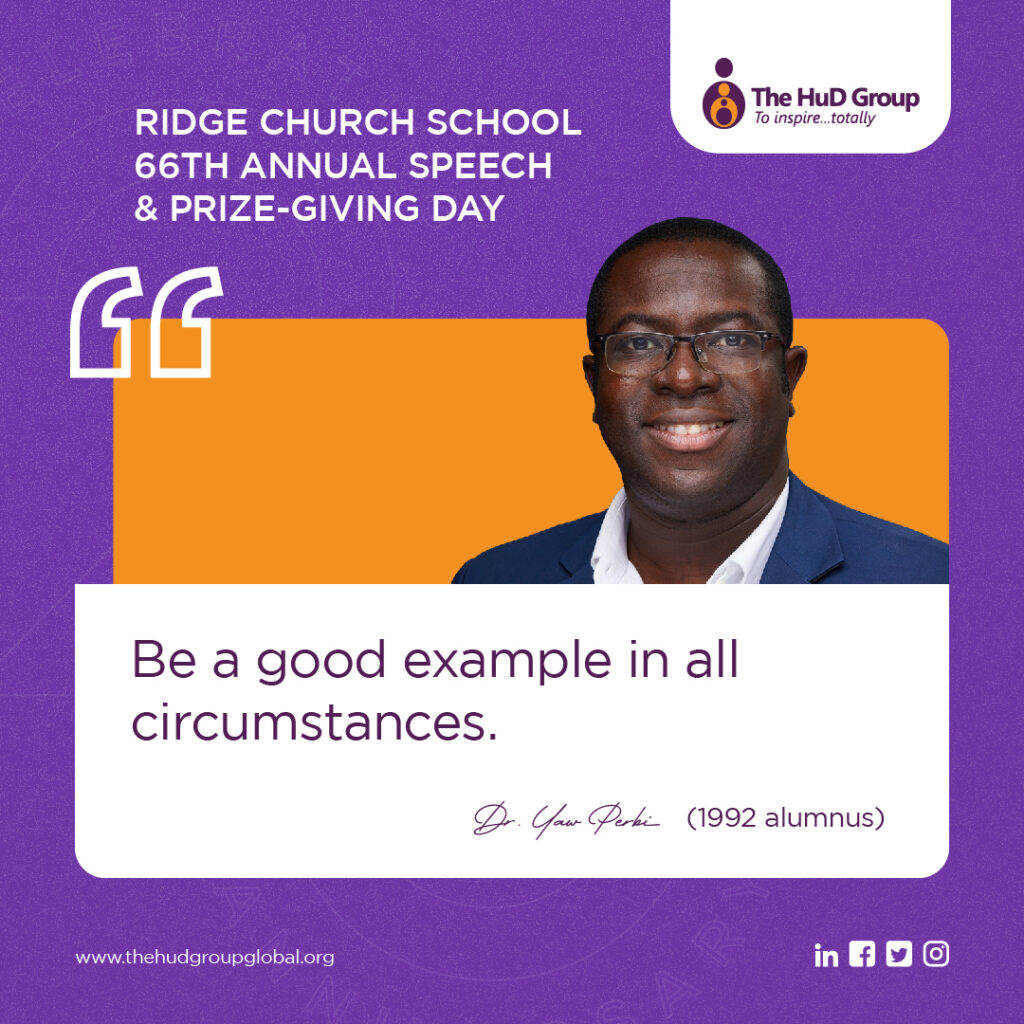
Of Birds, Green Pastures and Big Dreams
Had I known that my last conversation with Prof. Allison Howell (1951-2023) when I was briefly in Sydney, Australia in Q1 of 2023 would be my last, I bet I would’ve tried harder to see her in-person and not just be satisfied by our WhatsApp exchanges.
Receiving a copy of this ‘beauRiful’ compilation of her self-captured photos of approximately 30 different kinds of birds she sighted where she lived in Oyarifa (on the eastern outskirts of Accra, Ghana) has evoked all kinds of emotions. No, she was not a trained zoologist or ornithologist but her paradigm of creation care was fundamental, undergirding her formal training in Anthropology (Sydney), Environmental #Geography (Toronto) and Divinity (Edinburgh).
I was simultaneously sad and glad to be present at Allison’s funeral in Accra. She had requested to be flown back to Ghana, from Australia, to be buried among the people she served for 40 years, Ghanaians in general and the Kasena tribe of northern Ghana in particular.
These birds were largely attracted to and found in/around a green park in Kuottam Estates, Palm Valley, in Oyarifa which she had turned from a waste land, literally a rubbish dump, into an oasis of “rest and hope and peace.”
Earlier this week, I shared about last week’s Crystal Ball Africa panel conversations addressing “Are there green pastures at home?” Well, it seems it had to take an Australian to come all the way from ‘down under’ to show us one of such pastures. In Madam Howell’s own words, “…this area was just rubble and grass. People had thrown rubble, building waste and things like that into the area and I felt something better could be created.” Today, that lush green area with seats and swings and a little pond has been graciously named “Allison’s Greens” by the residents association. In fact, only two weekends ago it was the venue of a children’s party we dropped our nine-year old at.
It might interest you to note that although she was the transformer-in-chief, Allison never wanted her name on it! In fact, according to Alex Asiedu, a resident, “Allison came up with the idea of the park. Warm, resilient and self-effacing, she was able to convince the owners not to develop the strip of land on which it sits and did not give up until they gave in. Generous and humble, she single-handedly relieved the funds to develop it, and still resisted having her name on it. But the community, grateful for her foresight and generosity, would not have it any other way.” Yes, the learned prof lived for Soli Deo Gloria—God’s glory alone![]()
Back to the beginning, the ornithology. The beauRiful bird on the book cover is a Senegal Coucal (Centropus senegalensis). The one score and ten birds in the collection range from the greenish Rose-ringed Parakeet through the Purple Swamp Hen (Porphyrio porphyrio) and Green-backed Heron (Butorides striata) to the mainly yellow Little Bee Eater (Merops pusillus).
Don’t just seek greener pastures elsewhere, make some! Right where you are. You never know just who might flock there.
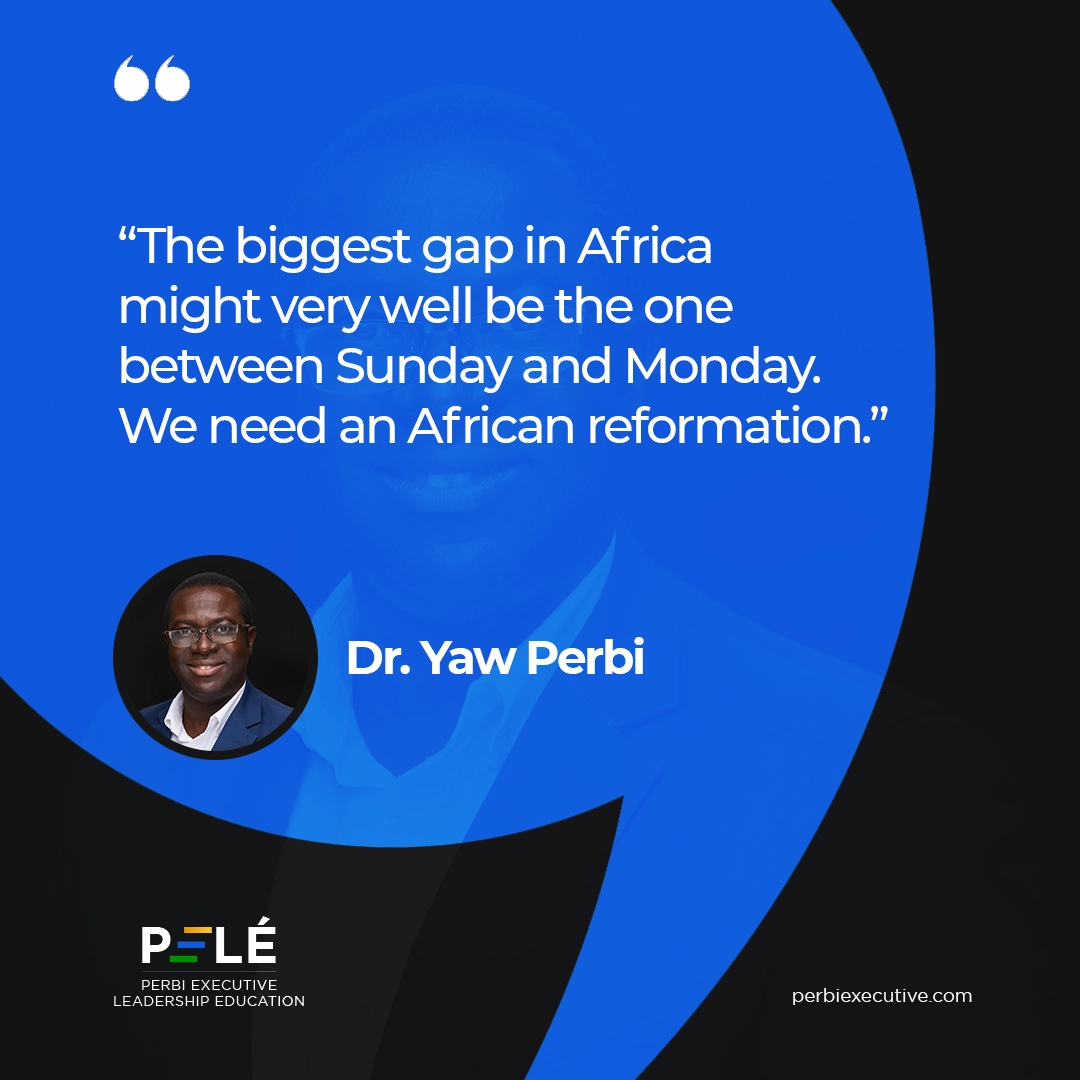
The Biggest Gap in Africa
Educated at Achimota School where one is taught “respect for all that is true and of lasting value in the old African culture, beliefs and ways of life,” even today I still mine for treasures that made ancient empires on the continent—from Asante to Zulu—greatly flourish. Thus I join the call for an African renaissance.
At the same time, considering how the modern world was greatly shaped by the 16th century Reformation such that places that ancient African and Asian empires considered ‘cultural backwaters’ suddenly rose, surpassed and even dominated dynasties, I seek an African reformation.
One of my favourite offshoots of the Reformation is how the new paradigm and value shifts precipitated (or at least catalysed) scientific inquiry and the Protestant work ethic. Some are of the opinion that the religious reformation and scientific revolution of that era were merely coincidental and not one of causation. I beg to differ—so do several academics.
The current meteoritic rise in African Christian faith, to the extent that since 2018 Africa has been the most numerically Christian continent in the world (Latin America is second, Europe is third), is impressive. However, this phenomenon that is only going to crescendo to the extent that by 2050 Africa will have more Christians than those next two continents combined, is mainly of the Pentecostal-Charismatic strain that has sign-seeking, miracle-performing and material-grabbing at its core, at least in practice.
The materialistic and consumption-based philosophy, also known as the Prosperity Gospel, as well as the wanton surrender of God-given human agency in exchange for divine miracles, signs and wonders are diametrically opposed to the Protestant paradigm. The Reformation-born Protestant work ethic attaches religious importance to labouring at one’s job and places a high value on productivity and frugality, viewing hard work and efficiency as an expression of one’s faith rather than as an excuse for the same.
When I see the throngs who celebrate faith on Sundays but don’t show it through their work in between Sundays, I lament about the huge disconnect. Don’t they know that their very Good Book is explicit that “faith without works is dead”? The biggest gap in Africa might very well be the one between Sunday and Monday.
May we receive much grace and sound training to close that looming lacuna in this new year. Otherwise not even the desperately-desired ‘24-hour economy’ which some, like the newly inaugurated government in Ghana (January 7, 2024), are touting can rescue us from our socioeconomic doldrums! We need an African renaissance and an African reformation for an African renewal this second quarter of the not-so-new-anymore millennium. Yes, 2025 begins a new quarter of the 2000-2099 millennium A.D. It’s about time. Mind the gap, Africa, mind the gap.

GOD KNOWS I like Dr. Mahamadu Bawumia (#DMB).
GOD KNOWS I like Dr. Mahamadu Bawumia (#DMB). A couple of weeks after he was sworn into office as Ghana’s Vice-President I called him and his wife “Muslim Ambassadors Extraordinaire” in an article that sought to help the Christian majority in Ghana particularly to appreciate that there isn’t only one kind of Muslim (see https://yawperbi.com/muslim-ambassadors-extraordinaire/). In the interest of disclosure, this was a lovely couple that were guests at my wedding over a decade prior and has gotten see again as a doctor at the 37 Military Hospital when they presented with a sick child a couple of years later. Adorable couple.
However, as a student of #leadership DMB’s initial moves as the #NPP’s presidential candidate this year sounded alarm bells for me. First, #leadership is #responsibility. Not willing or able to take responsibility for the economic doldrums his government—in which he is the head of the Economic Management Team—was bewildering. He blamed everyone including Corona, Russia and Ukraine but himself, and his government. That was bad.
What’s worse than this first shirking of responsibility, he belittled his high office—the second most powerful man in the country—by saying he was ‘only’ the “driver’s mate” (or bus conductor). Ah! Such an insult to leadership in general and the vice presidency in particular. Even those of us with no legitimate power of the people have made significant impact in our own small ways from our own small corners. How could a big man be so irresponsible?!
It has come to my notice that later Dr. Bawumia’s campaign tried to veer off the irresponsible and reprehensible ‘driver’s mate’ messaging but for people like me, it was too little too late.
And then the worst came: his choice of a right-hand man (literally on his right in this picture). That was a bad choice of an intemperate man, too highly inflammable for the second highest possible position of power in the land of our birth. And not long after being (mis)picked Dr. Matthew Opoku-Prempeh would prove my point about his ill-fit. In fact, on the very day he was outdoored he began his chain reaction of faux pas, daring to attack the founding president of our dear Republic. A national furore followed. So beyond the first red flag of not exhibiting basic responsibility as a leader, now he had added insult to injury by casting doubt about the quality of his decision-making by this choice of Veep.
When I was called to see Dr. Bawumia a couple of months ago, I flat out refused to honour the invitation. I like him (and his wife) but principles are principles; we must all have a True North and not just flow by the whims and caprices of others or directed by pocket economics.
Now that he has lost the election and has four years to reflect, regroup and rebound (if he still wants to and his party so endorses), I might be able to chip in my two cents as I did in the pre-2016 election and pre-2008 for his party.
I hope DMB will take full #responsibility this time—after what seems to be a trouncing of the incumbent, a ‘green tsunami’ of the opposition #NDC—and then we can leverage his other strong leadership attributes like being visionary and innovative. And to me, he comes across also as a humble servant-leader too.
These are by no means the only reasons DMB and the NPP lost—I have a laundry list of 29 items—but for me the faulty foundation of not taking #responsibility in the first place was his Waterloo.

AS WE GO VOTE By Jude Hama
Church leaders and members are to be engaged in National Politics by exercising their civic rights to vote. The National elections matters require proper ethical leadership response from Pastors and Church leaders; and indeed right conduct and behaviour from all church members and all
citizens. Heads of churches, Pastors and key Christian leaders would behave towards the key political candidates and political parties as “mother of twins”. A saying in our local culture goes like this: “A mother of twins lies in bed as truly a twin-mother: so as to give access to breast milk
to both babies”. She is to exercise her motherhood in a responsible and equitable way in relating to the twin babies. A glaring or consistently subtle leaning or support of a Head of church towards a Political Party and a key Political Party Candidate could send wrong signals of Partisan Politics
conduct into the Church Denomination and create divisions, mistrust; and strong disaffections from within the church. Church members in all Regions are discerning. They are all not likely to align themselves to only one political party. The integrity and ethical behavior of heads of
churches and Christian organizations in political matters is essential.
Church members may freely associate with any political party or political candidate and must also engage in even partisan political activity in a godly manner. As church members and people of God, our true godliness must be seen in our partisan political life and activities. Jesus must be
Lord over all aspects of our lives, including political conduct. Infact, a Ghanaian church leader gave the advice that as the Church becomes increasingly drawn by competing political interests and partisan political players, Heads of churches, Pastors, and key Christian leaders must ensure
their partisan politics should not get the church distracted from the sound and true worship of Jesus the Christ, our only Saviour and Redeemer God alone. Christian leaders must stick to following Jesus in a politically divided society. This is extremely important.
The most Rev. Dr. Paul Kwabena Boafo sent the following on National Elections and Ethical Leadership to the 2024 Synods of the Methodist Church Ghana across the country: “As a Church we continue to play our neutral role when it comes to National Politics. We pray for all who would present themselves as candidates to seek the mandate of the people to be elected. However, we ask all Methodist candidates to be men and women of integrity who will bring their discipleship to bear in their campaigns by avoiding the politics of insults and attacks on personalities. As people called Methodists, we understand that living the transformed and mature Christian life does not permit us to engage in any election malpractices. Let me remind us all of John Wesley’s advice on How to Vote in an Election: “I met those of our church who had votes in the upcoming election, and advised them:
-
1. To vote without fee or reward, for the person they judged most worthy.
2. To speak no evil of the person they voted against, and
3. To take care their spirits were not sharpened against those that voted on the other side.”
As we go vote, we urge you to be “Agents of Peace”. Be an “Agent of Peace”! go in the spirit of the Prayer of St. Francis: “Lord, make me an instrument of Your peace: Where there is hatred, let me sow love; where there is injury or hurt, pardon; where there is doubt, faith; where there is despair, hope; where there is darkness, light; and where there is sadness, joy. Amen.”
Rev. Dr. Bobby Harrington writes: “disciples or followers of Jesus should vote. Every disciple or follower of Jesus should vote, first and foremost, in a way that honours King Jesus”. It is our heritage as disciples or followers of Jesus to champion God’s Kingdom values which when absent will not make the people in the communities and the Nation function very well. These will include values like Truth; Humanity’s dignity and worth; care for the poor, lowly and marginalized; sound Biblical marriage and human sexuality values (no LGBTQ; no marital pairing that the Bible forbids); seeking justice (for justice and peace flow together); forgiveness, hope, and love. So decide how to vote according to God’s Kingdom values Jesus taught us which are essential for experiencing meaningful and abundant life at personal and home level as well as National level.
Professor Andrew Walls and Cathy Ross encourage the Church and church members to intentionally and persistently in all aspects of life to pursue the following five key mandates of the church:
-
a. “To proclaim the Good news of Jesus and His Kingdom”. To pursue effective
evangelization of all people groups in the nation, and the nations. (Matthew 28:18-20)
b. “To teach, Baptize and Nurture New believers”. To build up resilient matured Christ-like
persons.
c. “To respond to Human-need by loving service”. Believers are servants of a world in need,
d. “To seek to transform unjust structures of society”.
e. “To strive to safeguard the integrity of creation and sustain and renew the life of the
Earth”. Care for the environment.
These are the agenda of Jesus for the church, and Christ followers would vote for governance conditions that will facilitate the Church’s fulfillment of these agenda.
Jesus’ disciples or followers then would decide how to vote according to the values of Jesus Christ and His mandate to the Church.
And so the Bible urges Christ’s followers to pray for all people and key leaders of our communities, constituencies, and nation and “so that we can live peaceful and quiet lives marked by godliness and dignity. This is good and pleases God our Savior, who wants everyone to be saved and to understand the truth. (1 Timothy 2:2b-4 NLT).
So, go and prayerfully vote to honor God and to see what pleases Him achieved.
(The Author is a Consultant in Authentic Christian Spirituality and Discipleship and Former CEO of Scripture Union)
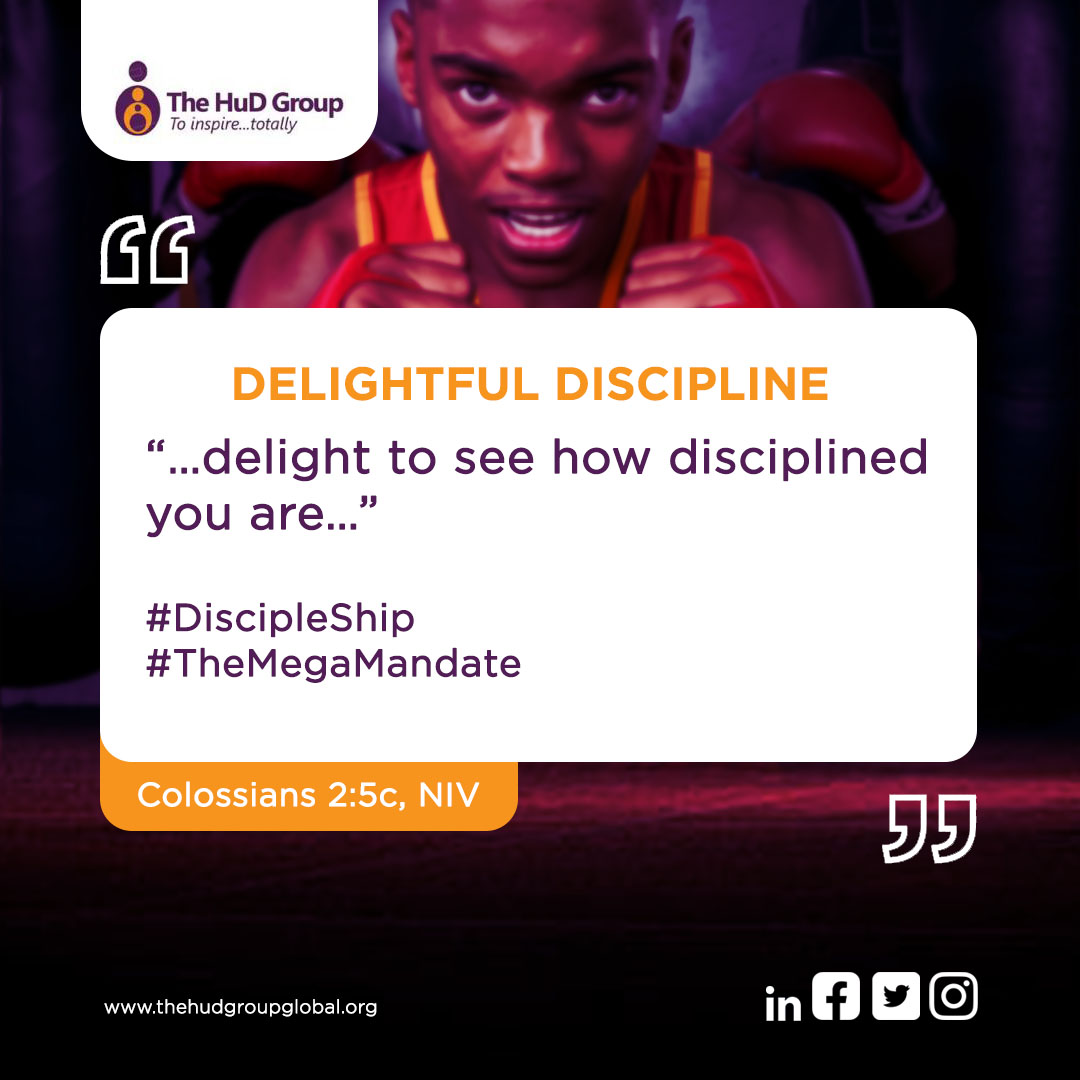
THE DELIGHT OF DISCIPLINE
If you hate discipline, you can neither be a good leader nor a good follower. Where does that leave one then? Lol!
Discipline is the practice of training oneself (or others) to obey rules (or a code of behaviour), to keep order(liness) and even punish to correct disobedience/disorder/disloyalty. While no human born of woman is 100% disciplined, there is a direct correlation between how disciplined one is and how successful they are. Deep, true and lasting success, that is.
There seems to have arisen an undisciplined crop of people, among Christ followers especially, who think God’s grace is a licence for disobedience and disorderliness. What they do not realize is that grace works better for disciplined people; just like those who leverage grace to work hard get miles ahead of the pack, a cut above the rest.
Part of the reason for throwing away discipline, it seems, is the notion that it impedes one’s freedom. The truth, however, is that indisciplined people aren’t free after all. They are slaves to whims and caprices, feelings, trends, social pressure and even the weather! “Only the disciplined are truly free. The undisciplined are slaves to moods, appetites and passions,” said Stephen R. Covey of blessed memory.
This Pauline scripture to his disciples in the old Turkish city of Colossae really caught my attention because in all of scripture, no one is more prolific in his writings and boasts in God’s grace than the lawyer-turned-preacher Paul. Yet he still saw the place of discipline and delighted that the Colossians were disciplined. In fact, to the quite unruly ones in the Greek city of Corinth he once penned, “Let all things be done decently and in order.”
Discipline provides the framework for fruitfulness; it is like the trellis that vines need to climb in order for grapes to fruit and remain. How on earth could one miss the obvious, that ‘discipline’ and ‘disciple’ have the same root. In fact, some, like Henri Nouwen, simply say “The word discipleship and the word discipline are the same word.” Consider discipline as “the effort to create some space in which God can act,” says Nouwen.
“I slept and I dreamt that life was joy. I awoke and I saw that life was duty. I worked–and behold, duty was joy” (Rabindranath Tagore). What is true of a disciplined life in general, as Tagore poignantly puts it, is true of the life of faith in particular. As Julius Coomson and I assert in our vital 2024 book, ‘Disciple Ship,’ “One cannot be a disciple of Jesus without discipline and disciplines” (p. 126). Sow discipline and reap development, dignity and delight.

#DIFFERENTIATION: A DOCTOR’S PRESCRIPTION FOR EVERYONE ON SOCIAL MEDIA
Photo: #RedClay exhibit of a variety of cobbler boxes at Ibrahim Mahama’s museum and gallery in #Tamale, northern #Ghana.
Every now and then I lose a hitherto social media ‘friend.’ The peak was during the days of the #Trump presidency. Yesterday, I was amazed at the sort of hero-sanitising that won’t make certain followers of a Ghanaian presidential aspirant (former president) accept that he wasn’t an angel even though the evils of the incumbent and (our short memories) are making the former look better than he really is (don’t forget he was kicked out after one term for a reason). Gosh! This sounds so much like Trump, who’s also seeking re-election across the Atlantic, after being a one-term president.
When I was an active, multiple award-winning #Toastmaster, we were cautioned to avoid topics bordering on #religion, #politics and #sex because they were ‘highly inflammable.’ These three tend to run our emotions high and our intellect low, leaving most with neither high IQ nor high EQ!
Yet, what is the hidden cost of not being oneself or sharing one’s honest opinions? It seems that even on one’s own social media wall–their own piece of the metaverse real estate–one is bullied and insulted should they state their honest opinion about these same ‘three musketeers’.
We all could use some good old #differentiation! Differentiation of self is a psychological state and skill where someone can maintain their sense of self, identity, thoughts, and emotions even though emotionally or physically close with others, even in intense or intimate relationships.
“Healthy groups allow every member to express their individuality without that difference being seen by other group members as a threat.” That’s differentiation. Enough of the herd mentality already!
Not even my wife and I agree on everything. But we will not treat the other as an ‘It’ (instead of a ‘Thou’, to reference Martin Buber) or be less of ourselves because of a fear of offending the other, if we are emotionally intelligent and emotionally healthy people.
I refuse to be cowered into keeping my own social media wall free from my own opinions because of poorly differentiated individuals of other religious and/or political persuasions. It is my wall, and in the words of the late Steve Biko, “I write what I like.” Some people are simply emotionally immature, unintelligent and unhealthy and being less of me won’t necessarily help them become more of themselves or make the world any better.
Can you disagree without being disagreeable? That’s a basic #differentiation test. The more highly differentiated one is, the more they can be themselves, vehemently argue out their point and still love and respect their ‘opponent’ (maybe not in life but just on a matter).
Jesus Christ, the greatest teacher that ever lived, was a very highly differentiated person. He would receive sworn enemies hospitably and even respectfully dialogue with his detractors. That didn’t change who He was or the Truth. If your only recourse to those you disagree with is silence or violence, insults or blocking, then you need a healthy daily dose of #differentiation. Especially on social media.
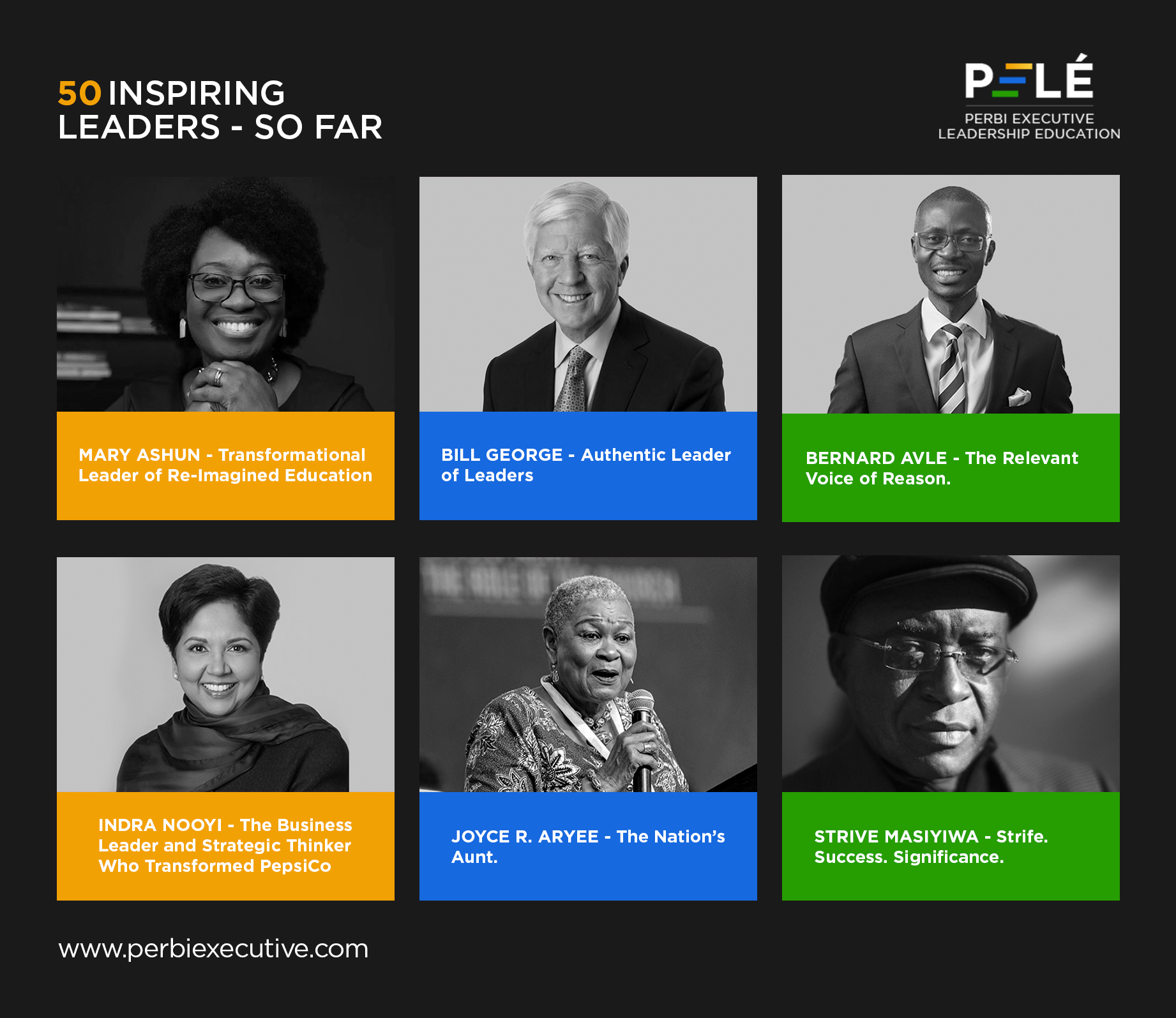
50 Inspiring Living Leaders
Dear Leader,
If you haven’t yet checked out the first 10% of the 50 Inspiring Living Leaders on the Perbi Executive Leadership Education (PELÉ) website, catch up quickly and get some oxygen for you leadership journey:
1. STRIVE MASIYIWA—Strife. Success. Significance: https://perbiexecutive.com/strife-success-significance…/
2. JOYCE ARYEE—A Nation’s Aunt: https://perbiexecutive.com/a-nations-aunt-joyce-r-aryee/
3. INDRA NOOYI—The Business Leader and Strategic Thinker Who Transformed PepsiCo: https://perbiexecutive.com/indra-nooyi-the-business…/
4. BERNARD AVLE—The Relevant Voice of Reason: https://perbiexecutive.com/bernard-avle-the-relevant…/
5. BILL GEORGE—Authentic Leader of Leaders: https://perbiexecutive.com/bill-george-authentic-leader…/
6. MARY ASHUN—Transformational Leader of Re-Imagined Education: https://perbiexecutive.com/mary-ashun-transformational…/
This 50 Inspiring Living Leaders series highlights current influencers who are succeeding in leadership, integrity, family or entrepreneurship in whatever field and exhibit most, if not all, of our values of PELÉ. We value people, growth, particularity, excellence, success, authenticity and significance. These stories are largely written in terms of growth, success and significance in leadership, integrity, family and entrepreneurship. While we do our best to receive personal references about each leader, most of our research and writing is based on literature review of publicly-available information. As authorities in leadership, we are fully aware that there is no such thing as a perfect leader, and leaders may have their flaws, but we choose to celebrate these inspiring living leaders for their achievements outlined in our series. Having said that, should you happen to have any incontrovertible evidence that any of our featured leaders does not fit our bill of an authentic leader, please write to us at info@perbiexecutive.com. Our vision at PELÉ is a flourishing global ecosystem of authentic leaders characterised by healthy growth, holistic success and lasting significance.
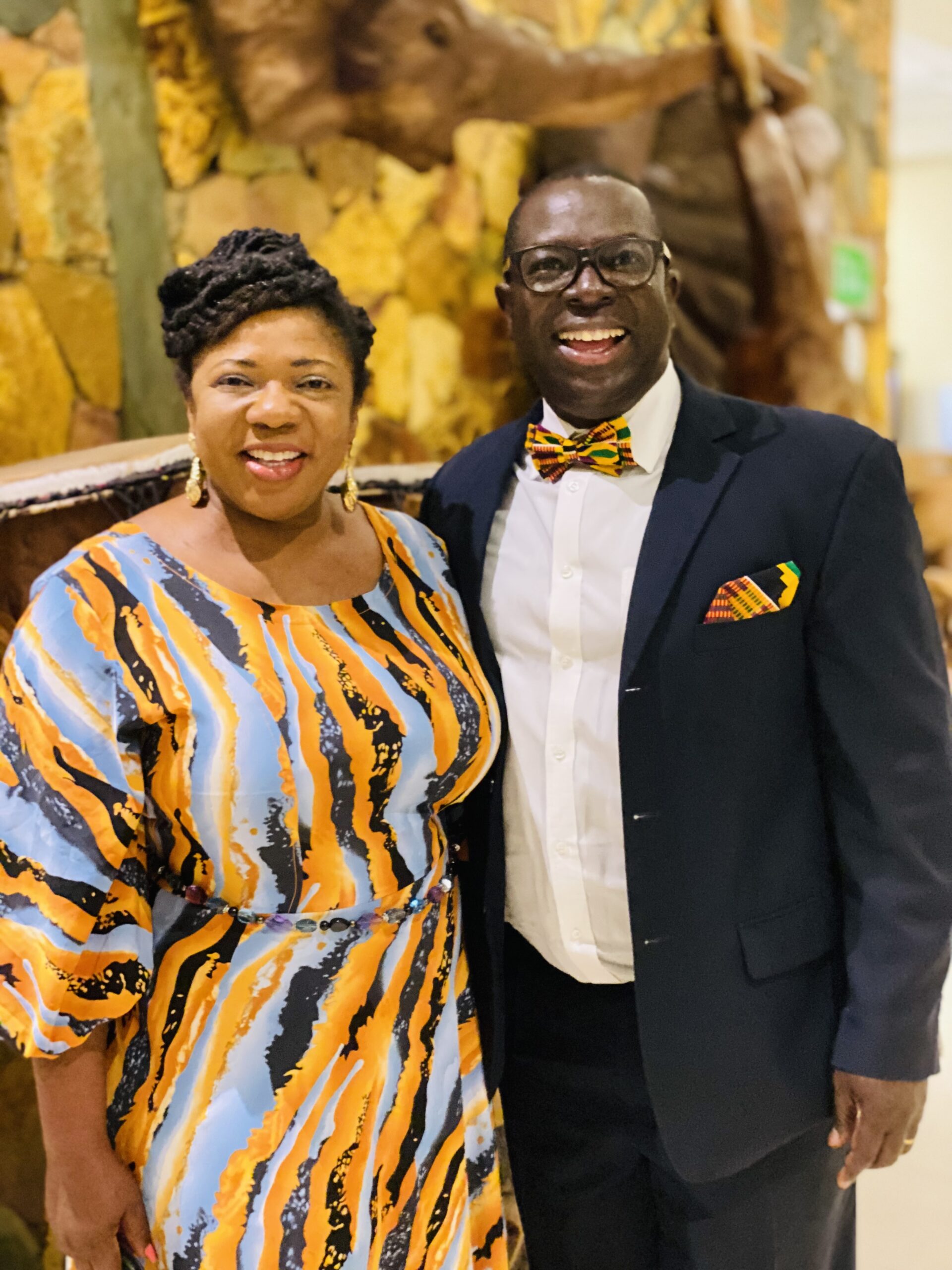
Meet The Nursing Doctor That Beat “Medico or Suicide!” Fair and Square
In those mid ’90s, one had to do a year (Level 200—if from the old O’ and A’ level system) or two years (Levels 100 and 200—from the new Junior and Senior Secondary School system) to see who qualifies, per superior GPA, to be called for the University of Ghana Medical School interview.
If my memory serves me right, of the nearly 900 of us, only a third made the interview list; and of that, only another third were admitted to medical (and dental) school. Folks were so bent on making the final 100 who will don the coveted white coat and carry boxes of bones on and off the med school bus that the mantra was “medico or suicide!” It was a serious threat in those heady undergraduate days.
I personally don’t recall anyone who didn’t make the cut actually physically killing themselves but many died emotionally, mentally and even socially. That nonsense killed many brilliant minds. I know of some that had to take a year off to heal; some even left the country for a bit. I still meet people who seem to be a pale shadow of themselves prior to this deathly mantra.
CAREER = PROFESSION + FIELD
I hope that career and counselling services have improved for the current generation but I can tell you for a fact that most of us were too young, back in the 1990s, to even definitely know what we wanted, career-wise. O of course many of us thought we knew, just like we thought we knew who we wanted to marry. Probably 0.0001% of us ended up marrying who we ‘so sure’ about.
In fact, many of us mixed up the passion for the general field (healthcare) with a passion for a particular profession (medical doctor). I was fortunate to learn the CAREER = PROFESSION + FIELD formula from the What Colour is Your Parachute? publication and many in that biological sciences pool could’ve found use for it too. Take my friend Retha (true story but not her real name), for example. She was a couple of years behind me. She didn’t make the dreaded med school list. And you wouldn’t believe the kind of hell her parents subjected her to, as a result. Thankfully she weathered the storm and did great at her plan B: Psychology. She loved it and excelled at Clinical Psychology in particular so much that she continued with graduate studies and eventually landed a PhD in it, in the United States of America.
Think about it: she still ended up in the field of healthcare which she was passionate about but realised she didn’t need to have the profession of a medical doctor to pursue that passion. The competent psychologist she became satisfied the same passion and fulfilled her calling. In any case, she’s still called “Dr.” today in her practice and who the heck cares if she earned the “Dr.” title from med school or from grad school, especially if she’s doing one heck of a good job in the clinic.
THE NURSING DOCTOR
These thoughts above were provoked by attending a recent Doctors in Business banquet at the Holiday in Accra, Ghana. As a guest keynote speaker, I had the privilege of sharing the high table with a course mate from Level 100 at the University of Ghana, Legon. We were both introduced as “Doctor” but I could swear she wasn’t in med school with me. By the end of the night it turned out that both the MC and myself were right. She was not med school with our batch, and she isn’t a medical doctor (I was right); but she is a doctor alright, a doctor in nursing (the MC was right).
“So I did biological sciences with you guys at Level 100 because I came to Legon as a science student,” Dr. Lillian Akorfa Ohene (PhD, MPhil, PN, BSc) intimated to me, but fortunately she wasn’t of the “medico or suicide!” tribe. “I branched off to nursing after level 100 because nursing was my first choice.” I’ve been so impressed that she knew exactly what she wanted even back then (forget the prestige of med school) and went straight for it. It reminds me of a brilliant 4.0 (perfect GPA) friend of mine who could’ve easily made it to med school but also chose to do Nutrition and Food Science, in the steps of her food scientist dad. She’s doing well in the industry, a leader of leaders.
Beyond knowing what she wanted and decisively moving towards it despite the definite distraction of medicine, Lillian’s story is also serendipitous as “the road rose to meet her.” She continues the conversation thus: “…but it happened that at that time, the nursing program started at level 200.”
IMPRESSIVE CURRICULUM VITAE
Today, Dr Lillian Akorfa Ohene is a Senior Lecturer and the Head of Department for Public Health Nursing at the University of Ghana’s School of Nursing and Midwifery. She is a certified paediatric nurse, who holds a PhD in Nursing from De Montfort University, Leicester, UK, a Master of Philosophy and Bachelor of Science in Nursing, both from the University of Ghana.
Lillian has over twenty (20) years of practice and teaching experience in higher academic institutions. Her research interest focuses on holistic care of sick children and the well-being of women and their families. As a qualitative researcher, she has explored extensively, the concept of family-centred care among sick children in the Ghanaian context. Some of her findings have been published widely in both local and international peer-reviewed journals. She also serves as a reviewer for several international journals.
On the international stage, Dr Ohene is a member, and a faculty counsellor of Chi Omicron Chapter of the Honor Society of Nursing, Sigma Theta Tau International (STTI) at Indianapolis, USA, a member of West Africa Postgraduate College of Nurses and Midwives (WAPCNM) and a foundation fellow of Ghana College of Nurses and Midwives (GCNM).
Dr. Ohene is also a Queen Elizabeth Scholar (QES) and serves as a mentor to her students, nurses and midwives locally and internationally. She has supervised over a hundred research projects, from undergraduate to PhDs. She is passionate about students’ academic success. The reason for our crossing paths last weekend is that she currently serves as a patron for three different student associations at the University of Ghana, of which Doctors in Business (DIB) is one. She serves on the board as well. Lillian is a family woman, married with three young adult children.
LILLIAN LESSONS LEARNT
Don’t die when life doesn’t go your way (death isn’t only physical); live to make so much of the further opportunity that rises to meet you that it’s a dis to that previous appointment (‘disappointment’). Through self-awareness, from introspection as well as feedback (take coaching and counselling seriously), know who you are and what you want and go for it. That’s where your future lies; don’t get distracted by the bling (even if its a shiny jewel like medicine). Yes, pursue your passion but be careful not to confuse the field and the profession. And remember that when you make a move, even when you don’t know what the next move after that step is, serendipity happens. Just make the move; it’s actually not moving at all that just might be suicidal.
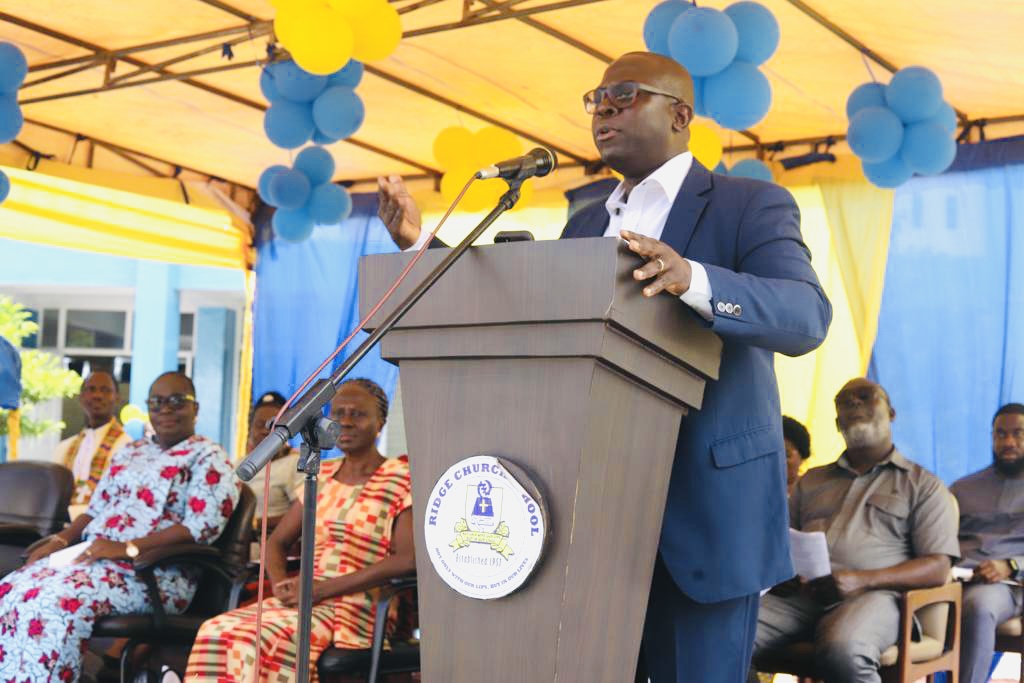
Be a Good Example in All Circumstances ~ 66th Annual Speech & Prize-giving Day, Ridge Church School
66TH ANNUAL SPEECH & PRIZE-GIVING DAY, RIDGE CHURCH SCHOOL
SPEECH BY DR. YAW PERBI, Global CEO of The HuD Group
26th August, 2023
Chairperson, Guest of Honour, School Board and Management, Teaching and Non-Teaching Staff, Parents and Learners, Invited Guests, (all protocols observed), good afternoon. It is an honour to return to Ridge Church School to address you today after leaving here 31 years ago. And it is a double honour as this is the second time I’ve been invited to do so over the last two decades.
The theme chosen for this year is BE A GOOD EXAMPLE IN ALL CIRCUMSTANCES and we shall consider it in three simple ways:
- WHAT IS?
- WHO SHOULD?
- WHY MUST?
1. BE A GOOD EXAMPLE IN ALL CIRCUMSTANCES: WHAT IS?
You must’ve heard from my introduction that my wife and I are blessed with seven biological children. Well, on Monday morning, our delightful six-year-old daughter, our fifth child called Nana Ahomka, came to tell me, “Daddy, I should be a leader at AWANA,” a children’s Bible training program. When I asked who a leader is she said, “Someone who sets an example for everyone else to follow.” I replied, “You got that right girl,” and that gave me the essence of my message today.
Today, the word “leader” is overused and abused. But for a moment, forget about all the 360 plus official definitions (yes) and consider this: a leader is someone who sets an example for others to follow. A good leader sets a good example; a bad leader does the opposite. Seeing it that way, a lot of so-called ‘leaders’ are really not good ones, even if they are in powerful political positions, are sensational speakers or even have top professions and enviable riches. Recently, we have seen our parliamentarians insulting and throwing physical blows in parliament. That is bad leadership. And it needs to be called out for what it is.
So WHAT IS being a good example in all circumstances? Good leadership or Godly leadership.
2. BE A GOOD EXAMPLE IN ALL CIRCUMSTANCES: WHO SHOULD?
Everyone of us, especially you, young ones—YOU ARE NOT TOO YOUNG TO BE AN EXAMPLE.
The Little boy Samuel was only 12 years old and could hear God’s voice at a time when “the word of the LORD was rare; there were not many visions.” [2] He heard God’s voice and told the ‘Papas’ of the land what to do. Ghana could use some Samuels right now—YOU!
That is what Paul the mentor meant when he said to his teenage mentee Timothy, “Don’t let anyone look down on you because you are young, but set an example for the believers in speech, in conduct, in love, in faith and in purity.” [3] In fact, sometimes it’s the adults that actually encourage us to do the wrong thing: I shall never forget my BECE experience in 1992 when a female invigilator who noticed I had completed my work, suggested to me to write the answers on an eraser so she could give it to another person who was struggling! Imagine that. An invigilator! I said, “No Madam. That is not right.” She was shocked.
Sometimes people don’t like us for not following their bad example or for calling out their bad example. But in a good society, good examples are reward. For example when I went to Achimota School, my good example was observed by the staff and I was selected to represent Achimota in exchange programme in America. It is also good examples who are selected to be prefects here, right?
Even at the university, I had to resist cheating in exams and started an organization called The HuD Group (The Human Development Group) [4] to help young people to become good leaders. When I got a national award for this, handed to me by then then Vice President of Ghana, Hon. Aliu Mahama, as the Newmont Ghana Highest Achievement Award winner at the Millennium Excellence Youth Awards in 2006, our Minister of Health then, Major (Rtd.) Courage Quashigah, wrote me a congratulatory letter, part of which read:
“We in the health sector are very proud of you and urge you to continue to be an Outstanding Achiever… It is my hope that you will bring your charisma and devotion to bear on every youth you encounter and they in turn will emulate your leadership example. On behalf of the entire health sector and on my own behalf, please accept my congratulations.” [5]
So WHO SHOULD be a good example in all circumstances? Everyone, especially you young ones!
3. BE A GOOD EXAMPLE IN ALL CIRCUMSTANCES: WHY MUST?
In 1792 King Louis XVI (16th) was taken from his throne by some rebels and imprisoned. His young son, the prince, was taken by those who dethroned the king. They thought that inasmuch as the king’s son was heir to the throne, if they could destroy him morally, he would never realize the great and grand destiny that life had bestowed upon him. They took him to a community far away, and there they exposed the lad to every filthy and vile thing that life could offer. They exposed him to foods the richness of which would quickly make him a slave to appetite. They used vile language around him constantly. They exposed him to lewd and lusting women. They exposed him to dishonor and distrust. He was surrounded 24 hours a day by everything that could drag the soul of a man as low as one could slip.
For over six months he had this treatment but not once did the young lad buckle under pressure. Finally, after intensive temptation, they questioned him. Why had he not submitted himself to these things why had he not partaken? These things would provide pleasure, satisfy his lusts, and were desirable; they were all his. The boy said, “I cannot do what you ask, for I was born to be a king.” [6]
Ladies and Gentlemen, we are all born to be kings and queens, princes and princesses, in the kingdom of God. WHY MUST you be a good example in all circumstances? You were born to be royalty.
CONCLUSION
In conclusion, be a good example in all circumstances. “The time is always right to do what’s right,” as Martin Luther King told some (Oberlin) students. Be an example, be a leader. As young as you are, even if everyone is doing the wrong thing and adults are pushing you to, be a prince/princess because:
1. that’s who you are—you were born to be a leader, to be king/queen
2. that’s what God’s word says and God expects
3. it’s for your own good (there’s no law against being a good example or punishment for it)
4. society needs it today and will remember you in history
5. Almighty God will reward you. Say, “Heaven backs me when I do the right thing!”
Be a good example—whether you are 6 or 60! Be the king and queen you were born to be. Be a good example in all circumstances, BE A GODLY LEADER!
References
[1] https://www.bbc.com/pidgin/tori-59738001[2] 1 Samuel 3:1, NIV
[3] 1 Timothy 4:12, NIV
[4] See www.thehudgroupglobal.org
[5] Portion of letter by Hon. Minister of Health in 2006, emphasis mine
[6] Sean Covey, The 7 Habits of Highly Effective Teens (and other sources)
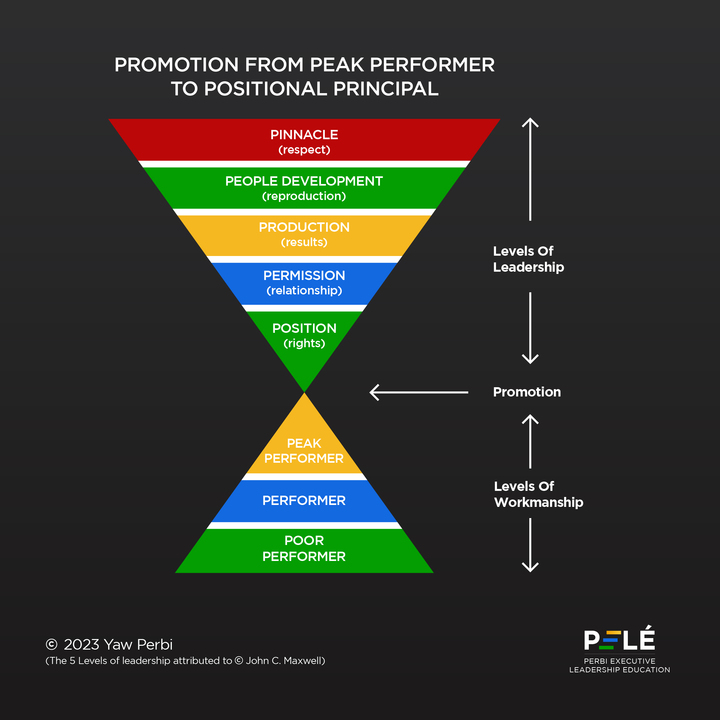
The Best Promotions are the Worst.
Here’s the worst thing about the best promotion. At one of my organizations, we recently had to let an excellent hire go. Come to think of it, we failed him. We failed him by promoting him.
You would think that all promotions are good but no. One of the worst kinds is being ‘elevated’ to become a leader just because you are an outstanding worker or producer. Working on stuff and excelling is very different from working with souls to excel. The reward for hard work is more work, weird yes, but the latter tends to be more mental work than manual —which most people find as more beneficial—also, more of working with people than working on things.
As one person shared about struggling with leadership upon her first promotion as a telco manager: “Within one month, I went from being the best programmer to the worst supervisor.” I’ve seen this happen to too many people in too many places. I grew up on the University of Ghana campus (both my grandfather and mother were professors there) and I would see time and time again fine lecturers promoted into leadership positions, from heads of department through deanship to vice-chancellorship and flail and fail. How many times have I said that a great chemist or erudite historian doesn’t necessarily make a great leader!
We do the same in the medical world, promoting top surgeons to head departments or if God doesn’t intervene, to head the hospital! When I was promoted to supervise the Military Polyclinic at the 37 Military Hospital in Accra, determining the doctors scheduling and all, in my opinion it was only because I wasn’t a bad doctor and had been around long enough. And no one gave me a minute’s training about leadership. Squat. Thank God I had been a private student of leadership for years prior.
It doesn’t start out as a bad thing; in fact, it is exhilarating at first for the recipient of the promotion. And the giver of the opportunity ordinarily also means well and feels good about it. But organizational leaders need to rethink the notion of making people supervisors, managers or leaders as a reward for diligent or even skillful individual technical work. It can backfire, seriously.
A STORY I CAN’T GET OVER
One of the most poignant illustrations of this phenomenon of worker/rewarded-as-leader is told by my mentor Bill George in his book ‘True North.’ It’s about the person who confessed upon her first promotion as a telco manager, “Within one month, I went from being the best programmer to the worst supervisor.” Here are some more details:
“It’s unbelievable how bad I was. I didn’t know how to delegate. When somebody had a question about their work, I’d pick it up and do it. My group was not accomplishing anything because I was on the critical path of everything. My boss saw we were imploding, so he did an amazing thing: He gave me every new project that came in. It was unreal. At 4:30 PM, my team would leave, and I’d be working day and night trying to dig through this stuff.
“Finally, I couldn’t take it any longer. I went to his office, stamped my foot like a 5-year-old, and said, “It’s not fair. I have the work of 10 people!” He sad calmly, “Look out there. You have 10 people. Put them to work.” It was such a startling revelation. I said sheepishly, “I get it.”” [1]
If this person hadn’t eventually learned to lead people, she would never have made it to becoming president and CEO of the American Red Cross on June 23, 2008. Prior to that she had also held top management positions at AT&T Corporation and Fidelity Investments. She is a member of the board of trustees of Johns Hopkins University and the board of directors of DTE Energy.
This is Gail J. McGovern we’re talking about here, even recognized by Fortune magazine in 2000 and 2001 as one of the top 50 most powerful women in corporate America. Alas, not all of such stories that begin with such ‘good promotions’ end well, and even when they do, not without significant damage to many.
DIAGNOSIS OF LEADERSHIP FAILURE POST PROMOTION
It takes both a different mindset and skill set to move from being an excellent worker to being a good leader, let alone a great one. Yet we come to the world of work with both a mindset and skillset that ill-prepare us for leadership success. Even prior, we are socialized largely to excel as individuals. I concur with Bill George that this unpreparedness is attributable to our upbringing:
“…so much of our early success in life depends upon individual efforts, from the grades we earn in school to our performance in individual sports to our initial work assignments. Admissions offices and employers closely examine those achievements and use them to make comparisons. …As we are promoted from individual roles to leadership, we believe we are being recognized for our ability to get others to follow us…
“To become authentic leaders, we must discard the myth that leadership means having legions of supporters following us as we ascend to the pinnacles of power. Only then can we realize that authentic leadership is serving people… How else can they unleash the power of their organization unless they motivate people to reach their full potential? … Only when leaders stop focusing on their personal needs and see themselves as serving others are they able to develop other leaders.” [2]
ROAD MAP TO LEADERSHIP SUCCESS POST PROMOTION
If Maxwell’s 5 Levels of Leadership is anything to go by, then when one is promoted from the top echelons of the worker floor (Peak Performer/Worker Level 3 in diagram above), they only end up at Level 1 of leadership: Position. The lowest level of leadership—the entry level, if you will—is position. People only follow if they believe that they have to (otherwise you might use your powers of carrot and stick). If this leader takes the hint and invests in their leadership growth, they can move to Leader Level 2—Permission—which is based on relationship. At this level, people choose to follow because they want to.
You will notice that even what Gail was trying to get done at work, putting the 10 people ‘out there’ to work, is still only mid-level in the Maxwell scheme of things: Production. Good leaders know how to motivate their people to GTD – get things done! And getting things done is what Leader Level 3 is all about. But they’re only good; not great. Leader Level 4 — People Development—can be summed up in another word: Reproduction. One’s goal at this level is to identify and develop as many leaders as one can and investing in them to help them grow. Here (Leader Level 4), you’re producing people as leaders, not producing work through people (Leader Level 3).
The most challenging and highest level of leadership, Level 5, is the Pinnacle. According to Maxwell, it requires longevity as well as intentionality in investing one’s life into the lives of other leaders and organizations for the long haul (while growing yourself as lifelong learner all the while). People follow such because of who they are and what they represent. Their leadership gains a positive reputation, betters still, one has earned respect.
Note that Level 5 leaders develop Level 5 organizations. I will add that in the leader versUs institutions debate—as to whether it is strong leaders or strong institutions we need to develop long-term—I would say that it takes Level 5 leaders to build the structures and systems that produce strong institutions. This is the realm of legacy. As a result, Level 5 leaders often transcend their position, their organization, their industry and perhaps even their nation.
And nothing accelerates leaders through these levels, from 1 to 5, like intentional coaching.
CONCLUSION
As you can tell already, it’s a long way from being the best worker to being a great leader. There is nothing more painful than a “highly capable individual” (as Jim Collins puts it) thinking that just because they’ve been a peak performer and ‘made it’ onto the supervision, management or leadership floor that they’ve got what it takes to run the ship. One’s productive contribution through individual effort in knowledge, skills and good work habits won’t cut it. As promoters, if we promote people and fail to plan a leadership growth path alongside that, we’ve inadvertently planned to fail them.
Congratulations on your promotion, but to ensure that dream-come-true doesn’t become a nightmare, and the reward a trap instead, you must be aware that it’s a floor and not the ceiling. Top floor workers’ triumphal entry through the golden portal of promotion only lands you as a ground floor leader. Welcome to Level 1 of Leadership: position. Just that.
References
[1] Bill George. True North: Becoming an Authentic Leader. Second edition; expanded and updated edition. Jossey-Bass, Hoboken, NJ, 2015, pg. 186-187.
[2] Ibid, pg. 185


